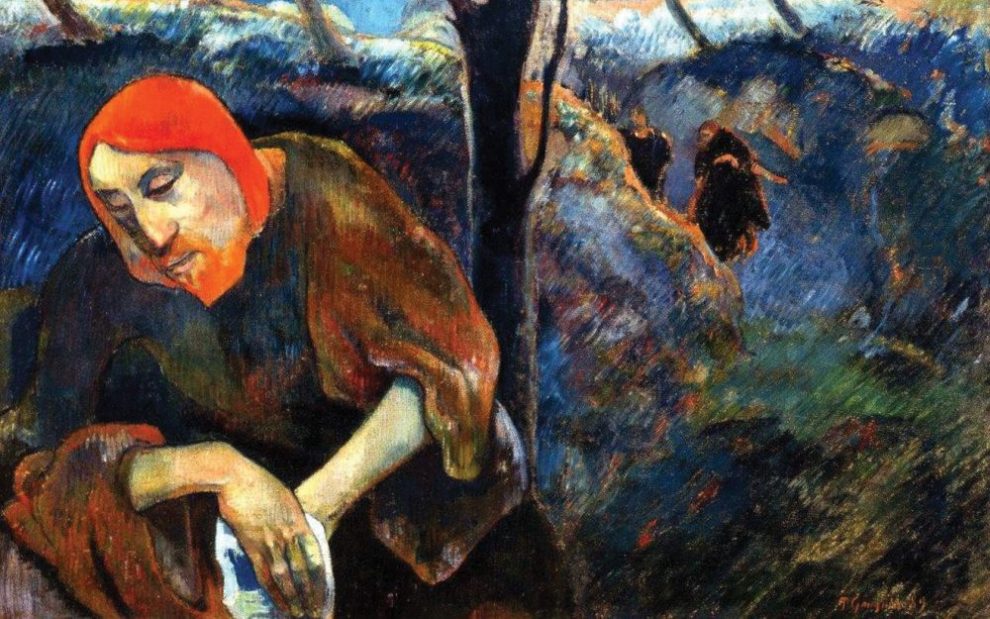Exile is an experience of abandonment, something we have likely all encountered at some point on our life journeys. It is rooted in the archetype of the orphan, which appears across fairy tales and popular culture in characters such as Dorothy in The Wizard of Oz, Little Orphan Annie, and Harry Potter. The Genesis story of the Garden of Eden is a primal orphan myth explaining in symbolic terms where our experience of being exiles in this world originates.
In the first book of the Hebrew scriptures, we begin with two different creation stories. The first story is where we hear about the unfolding of God’s creation over the span of seven days. God brings all things into being, including the sun, moon, stars, and all living beings. God calls all of these very good and rests on the seventh day.
The second creation story is the story of Adam and Eve in the Garden of Eden. Here we find the first human is formed from mud and animated with the breath of life. The second human is formed from the first, and together they are invited to savor the delight of the Garden, but not to eat of the Tree of Knowledge of Good and Evil.
Both of these stories are mythic, in the sense that they are written to convey powerful truths. The first story celebrates all aspects of creation and our origins in the divine. The second story helps explain why we have suffering and death in the world. When Adam and Eve betray this original command, we are placed in the heart of exile and banished from Eden.
An archetype is an inner pattern or experience that is found across cultures. The fundamental experience of the orphan is abandonment, feeling like an exile, and longing for an experience of being at home in the world. The orphan archetype in each of us is activated by all the experiences during which the child in us feels abandoned, betrayed, victimized, neglected, or disillusioned.
We are all orphaned in one way or another simply because we were raised by parents with their own wounds. Culture and society also contribute to this orphaning process in all the moments where we feel like we don’t belong or as if we are on the margins without support for our basic needs due to unjust systems.
While our first instinct may be to run when feelings of need and loneliness arise, the central task of the orphan is to feel this pain of the unmothered child. We are invited to face our experiences of pain and disillusionment. The orphan calls us to wake up, let go of our convictions that we should be exempt from suffering, and face painful realities. We all have losses and catastrophes, we all carry grief that has gone unmourned and been pushed away.
When Jesus was in the Garden of Gethsemane, he experienced the betrayal of one of his disciples and friends, Judas. He knew Peter would deny him. The disciples were not able to stay awake when he asked them to on the evening before his death. Betrayal and denial are forms of abandonment.
As he hung on the cross, dying a slow and painful death, Jesus utters that heart-wrenching question: “Eloi, Eloi, lema sabachthani?” which is translated, “My God, my God, why have you forsaken me?” (Mark 15:34). Jesus in the fullness of his humanity connects to all of us who have felt forsaken by life. We hear similar cries in the psalms of lament and Book of Lamentations in the Hebrew scriptures.
Embracing the witness of Jesus, who incarnates the vulnerability as well as the strength of being human, we discover the gift of honoring our own moments of exile. Welcoming our inner orphan can help to crack open our intuition and empathy. Those who suffer in conscious ways are ultimately able to offer the compassion cultivated by accepting ourselves and our healing as a call to bring our gifts back to the community. The orphan invites us into interdependence with others as we realize that we are all wounded in some way.
Ultimately the orphan learns that it is a source of power to face our sense of victimization and limitations and to fully feel the pain caused by them. Conscious suffering is the gateway to our own spiritual awakening and maturity. Acknowledging this frees us to work together to create a better world.
Healing begins when we feel the pain and reality of our orphaning experiences and progress to recognizing how we have denied part of ourselves. The gift of the orphan is to connect to our own wounding, to find safe spaces to share it, and to create relationships of mutual love and care.
To the degree that we do not acknowledge the orphan inside us, that orphan is abandoned by us as well as the world. We perpetuate this cycle of abandonment in many ways. Sometimes we are so afraid of being left by someone that we leave before they have a chance, so we never allow ourselves the possibility of healing. The orphan may provoke rejection simply to have a greater sense of control over life. Since disappointment, rejection, and abandonment are seen as inevitable, we feel just a bit better by leaving first.
Being an exile is at the heart of the human experience, especially in current times of mass displacement due to refugee crises caused by multiple wars, mass casualties due to gun violence, and the climate crisis causing destructive storms, floods, heat waves, and other extreme weather events. Even if you are fortunate enough to not have been directly impacted by these yet, turning on the news is often an experience of feeling helpless and overwhelmed.
In our ordinary lives, the betrayal or death of loved ones, losing a job, or developing an illness can feel like experiences of abandonment.
The inner work of the orphan within each of us is to open ourselves to this human experience and acknowledge it as Jesus did on the cross in the powerful words that echo across the centuries. He cried out. We are likely tempted to deny this pain, to put on a brave face, or to numb ourselves as a way of coping.
In his book, The Wounded Healer (Image), Henri Nouwen writes:
“Nobody escapes being wounded. We are all wounded people, whether physically, emotionally, mentally, or spiritually. The main question is not ‘How can we hide our wounds?’ so we don’t have to be embarrassed but ‘How can we put our woundedness in the service of others?’ ”
At the heart of exile is a longing to come home again. What does this mean for us in this world? Home may be a place, a house we love, in a landscape we love, with a community who cares for us. It may be a more ethereal kind of reality, like a feeling we have when we experience complete acceptance by others. Or the feeling we have when we walk along the seashore or in a woodland and feel ourselves aligned with God’s creation and its pulsing aliveness. Being at home indicates a state of ease, of feeling welcome, of belonging.
Ultimately it is the experience of embracing our wounds and allowing them to be a portal into our service to the wider community. Our broken places are the source of new life when we allow our healing journeys to bring us into deeper compassion for others who suffer. Jesus witnessed to this reality in many ways.
Suggestions for honoring your inner exile
- Make time to honor your grief over personal losses as well as global ones. Create space in your life to weep and wail. Spend some time journaling about the things you mourn. Then allow space to move and cry as needed. Music can often be a helpful container for this process. Grief unacknowledged does not disappear; it often manifests as depression or anger.
- Look up Mark 15:33–38 and pray lectio divina with it. As you read, listen for a word or phrase that shimmers for you or challenges you. Then let that unfold in your imagination, welcoming in images, memories, and feelings. Listen for any sense of invitation arising. Then rest in silence to close. To extend this prayer, return to the text and pray with the imagination as St. Ignatius recommends. Have a conversation with Jesus in his moment of anguish and see what he wants to say to you about this experience and your own places of wounding.
- Reflect on what home means for you. What are the qualities you experience when you feel at home somewhere? What brings you a sense of belonging?
- Write a prayer asking the Divine presence to remind you of the home to be found in God’s love.
- Read Matthew 25:35–36 where Jesus says, “For I was hungry and you gave me food, I was thirsty and you gave me drink, a stranger and you welcomed me, naked and you clothed me, ill and you cared for me, in prison and you visited me.” Reflect on the strangers in your life you could make feel more welcome.
- Create communities of care in your neighborhood and cities. Cultivate connections with those who live nearby. Find ways to advocate for protection for immigrants and refugees. Let your experience of abandonment become a gift of grace for others.
This article also appears in the September 2023 issue of U.S. Catholic (Vol. 88, No. 9, pages 22-24). Click here to subscribe to the magazine.
Image: Christ on the Mount of Olives, Paul Gauguin, 1889















Add comment